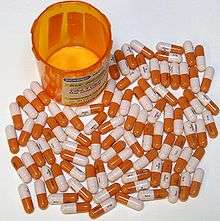Pharmaceutical lobby
The pharmaceutical lobby refers to the representatives of pharmaceutical drug and biomedicine companies who engage in lobbying in favour of the pharmaceutical industry and its products.

Political influence in the United States
The largest pharmaceutical companies and their two trade groups, Pharmaceutical Research and Manufacturers of America (PhRMA) and Biotechnology Innovation Organization, lobbied on at least 1,600 pieces of legislation between 1998 and 2004. According to the non-partisan Center for Responsive Politics, pharmaceutical companies spent $900 million on lobbying between 1998 and 2005, more than any other industry. During the same period, they donated $89.9 million to federal candidates and political parties, giving approximately three times as much to Republicans as to Democrats.[1] According to the Center for Public Integrity, from January 2005 through June 2006 alone, the pharmaceutical industry spent approximately $182 million on Federal lobbying.[2] The industry has 1,274 registered lobbyists in Washington D.C. [3]
Controversy in the U.S.
Prescription drug costs in the U.S.
Critics of the pharmaceutical lobby argue that the drug industry's influence allows it to promote legislation friendly to drug manufacturers at the expense of patients.[4] The lobby's influence in securing the passage of the Medicare Prescription Drug Improvement and Modernization Act of 2003 was considered a major and controversial victory for the industry, as it prevents the government from directly negotiating prices with drug companies who provide those prescription drugs covered by Medicare. Price negotiations are instead conducted between manufacturers and the pharmacy benefit managers providing Medicare Part D benefits under contract with Medicare. In 2010 the Congressional Budget Office estimated the average discount negotiated by pharmacy benefit managers at 14%.[5]
The high price of U.S. prescription drugs has been a source of ongoing controversy. Corporations state that the high costs are the result of pricey research and development programs. Critics point to the development of drugs having only small incremental benefit.[4][6] According to Marcia Angell, the former head of the New England Journal of Medicine, "The United States is the only advanced country that permits the pharmaceutical industry to charge exactly what the market will bear."[7] In contrast, the RAND Corporation and authors from the National Bureau of Economic Research have argued that price controls stifle innovation and are economically counterproductive in the long term.[8][9]
See also
- Bad Pharma (2012) by Ben Goldacre
- Big Pharma (2006) by Jacky Law
- Big Pharma conspiracy theory
- Ethics in pharmaceutical sales
- List of pharmaceutical companies
- Lists about the pharmaceutical industry
- Pharmaceutical marketing
References
- "Drug Bill Demonstrates Lobby's Pull". Retrieved 29 April 2016.
- Pushing Prescriptions - The Center for Public Integrity Archived 2007-07-03 at the Wayback Machine
- "USATODAY.com - Drugmakers go furthest to sway Congress". Retrieved 29 April 2016.
- "Turn the Volume Down on Drug Ads". The New York Times. November 27, 2015.(subscription required)
- "www.cbo.gov" (PDF).
- Malcolm Gladwell (25 October 2004). "High Prices". The New Yorker. Retrieved 29 April 2016.
- "Interviews - Marcia Angell - The Other Drug War - FRONTLINE - PBS". Retrieved 29 April 2016.
- "U.S. Pharmaceutical Policy in a Global Marketplace | RAND".
- Santerre, Rexford E.; Vernon, John A. (2006). "Assessing Consumer Gains from a Drug Price Control Policy in the United States". Southern Economic Journal. 73 (1): 233–245. doi:10.2307/20111885.